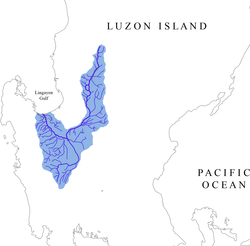Agno River
| Agno River | |
| Country | Philippines |
|---|---|
| Provinces | |
| Regions | |
| Tributaries | |
| - left | Tarlac River |
| Source | |
| - location | Cordillera Mountains |
| - elevation | 2,090 m (6,857 ft) |
| Mouth | Lingayen Gulf |
| - location | Lingayen, Pangasinan, Ilocos Region |
| - elevation | 0 m (0 ft) |
| - coordinates | 16°02′17″N 120°12′00″E / 16.03806°N 120.20000°ECoordinates: 16°02′17″N 120°12′00″E / 16.03806°N 120.20000°E |
| Length | 206 km (128 mi) |
| Basin | 5,952 km2 (2,298 sq mi) |
| Discharge | for Lingayen Gulf |
| - average | 660 m3/s (23,300 cu ft/s) |
|
Watershed of the Agno River
|
|
Agno River is a river in the island of Luzon in the Philippines. Traversing the provinces of Benguet and Pangasinan, it is the third largest river system in the country with a drainage area of 5,952 km².
It originates in the Cordillera Mountains and empties into the South China Sea via the Lingayen Gulf. The river is 206 km long. Roughly 2 million people live in the Agno River Valley and it comprises one of Philippines' larger population clusters.
The river is dammed by three hydroelectric power plants; the Ambuklao Dam in Bokod, the Binga Dam in Itogon, and the San Roque Dam in San Manuel.
The Agno River is the main drainage system of the area and has a catchment area of 5,952 square kilometers. It is the third largest river in Luzon (next to Cagayan River and Pampanga River) and the fifth largest river in the Philippines.
The Agno is the largest Philippine river in terms of water discharge, draining around 6.6 cubic kilometers of fresh water into Lingayen Gulf, or almost 70% of the total fresh water input into the gulf.
The headwaters of Agno River are at the slopes of Mount Data in the Cordillera Mountains at an elevation of 2,090 m, where it drains Cretaceous to Paleocene igneous basement rocks, and marine siliciclastic and carbonate rocks. Of its total length, about 90 kilometers runs through mountainous terrain and canyons.
...
Wikipedia


